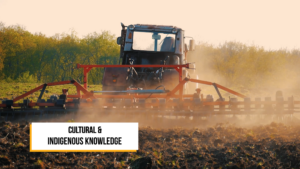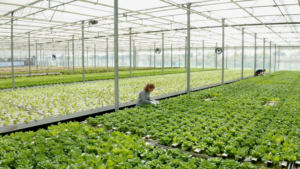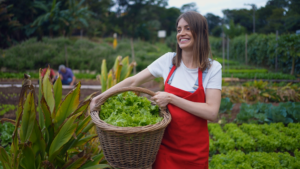___
By Rodaportal
In the fast-paced rhythm of our daily lives, it’s all too easy to forget the incredible journey our food takes before it finally graces our dinner tables. Most of us rush to the grocery store, grab what we need, and rarely pause to ponder the extraordinary path food undergoes before it lands on our plates. But concealed behind the illusion of plenty, there exists a silent crisis, a ticking time bomb that poses a grave threat to our food systems. Recent research has unearthed alarming facts that we all need to be aware of.
A Shrinking Farming Landscape
According to a study conducted by the University of Colorado Boulder, a troubling trend is emerging. The number of farms worldwide is projected to decrease by half by the end of this century. This implies that not only will there be fewer farms in existence, but the ones that remain will be larger in scale. While farm consolidation has been a longstanding phenomenon in countries like the United States and Western Europe, it is now spreading globally.
This shift toward urban areas and the decreasing rural populations can be attributed to various factors. People move from rural to urban areas in search of better opportunities and an improved quality of life, resulting in fewer individuals available to work in rural regions. This trend has implications for both urban and rural communities. The decline of rural areas impacts the economy and the quality of life for those who choose to remain.
Striking a balance between urban and rural areas is essential. The preservation of cultural heritage, and traditions, and the agricultural sector’s vitality hinges on maintaining rural areas while supporting urbanization. It is imperative to consider the needs of all people in the pursuit of a better future for everyone.

Impact on Biodiversity and Food Security
The trend of agricultural consolidation and expansion poses a grave threat to the biodiversity of farmland. Larger farms tend to rely heavily on monocultures, which not only reduces the variety of crops but also disrupts the ecological balance. Conversely, smaller farms tend to be more diverse, cultivating a wider range of crops and often employing more sustainable practices. This diversity not only makes them more resilient to pests and adverse weather conditions but also supports a broader range of wildlife and beneficial organisms.
The loss of these small, diverse farms could have significant ecological consequences, leading to the decline of pollinators, soil degradation, water pollution, and other related issues. Therefore, it is crucial to promote and support the maintenance of smaller farms as a way to protect biodiversity and mitigate potential environmental risks associated with large-scale farming practices.
Furthermore, our food supply is at risk. Smaller farms may cover only a quarter of the world’s agricultural land, but they produce a third of the world’s food. The consolidation of farms means that fewer individuals will own and farm the available land, placing our food supply in jeopardy.

Cultural and Indigenous Knowledge
The consolidation of farms toward larger scales has led to the erosion of cultural and Indigenous knowledge. Indigenous and traditional communities possess invaluable insights that have been passed down through generations. This wisdom encompasses knowing when to plant, how to manage soil, and how to adapt to changing weather patterns, all intricately woven into their cultural and spiritual identity. As farms consolidate and mechanize, these cherished traditions are often left behind, replaced by new technologies and standardized practices.
The loss of heritage, wisdom, and a profound connection to the land is a disheartening consequence of this trend. More concerning still is the risk of losing cultural and Indigenous knowledge essential for sustainable agriculture and a harmonious relationship with the land. Therefore, it is imperative to find ways to merge modern agricultural practices with the priceless insights of cultural and Indigenous knowledge to create a food system that is resilient, diverse, and culturally rich. It’s high time we take action to preserve our cultural heritage and work toward a more sustainable future.

Diverse Food Portfolio: A Necessity
Just as a diversified investment portfolio is less risky than one lacking diversity, the same principle applies to our food sources. With approximately 600 million farms worldwide, our food portfolio is diverse. When one farm faces challenges, the overall impact is balanced by the success of others. However, reducing the number of farms while increasing their size concentrates the risk.

The Path Forward
It’s not all bleak. Farm consolidation can lead to improved labour productivity and economic growth. Larger farms can offer more opportunities for individuals to choose their career paths, both within and outside the agricultural sector. Nonetheless, the future of farming necessitates careful planning and support. The agricultural sector is plagued by high suicide rates, especially in the United States. Therefore, we need education and support systems in place to assist the farmers of the future.

Conclusion
Our food system stands at a crossroads. The silent crisis of farm consolidation threatens biodiversity, food security, and the preservation of valuable knowledge. As consumers and citizens, we must remain vigilant of these trends and advocate for policies that safeguard biodiversity, promote climate resilience, preserve Indigenous wisdom, and foster rural economic growth. It’s not just about what we eat today; it’s about the legacy we leave for future generations.
To delve deeper into this pressing issue, we invite you to watch our YouTube video titled “The Silent Crisis: Our Food System Is Collapsing!.” This video provides further insights and action steps to address the challenges our food system is currently facing. Your engagement and actions can make a meaningful difference in ensuring a sustainable and resilient food system for everyone.

